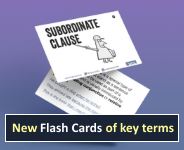Glossary: phoneme
Explanation
A phoneme is the smallest unit of sound that signals a distinct, contrasting meaning. For example:
- /t/ contrasts with /k/ to signal the difference between tap and cap
- /t/ contrasts with /l/ to signal the difference between bought and ball.
It is this contrast in meaning that tells us there are two distinct phonemes at work.
There are around 44 phonemes in English; the exact number depends on regional accents. A single phoneme may be represented in writing by one, two, three or four letters constituting a single grapheme.
- The word cat has three letters and three phonemes: /kæt/
- The word catch has five letters and three phonemes: /kaʧ/
- The word caught has six letters and three phonemes: /kɔ:t/
Englicious contains many resources for English language in schools, but the vast majority of them require you to register and log in first. For more information, see What is Englicious?

